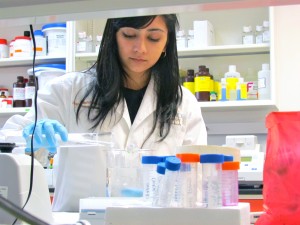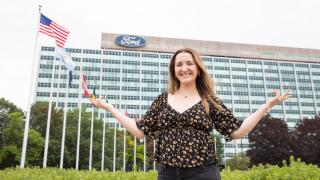

Miriam Bukhsh isn’t comfortable with those odds. That’s why the University of Michigan-Dearborn senior spends hours in the lab trying to find a cure for triple negative breast cancer.
Bukhsh works closely with UM-Dearborn Lecturer Cecilia Speyer to test whether a prescription drug used to treat epilepsy also can limit the spread of cancer cells in triple negative breast cancer patients.
“This experience is invaluable,” said Bukhsh, who plans to graduate in April with bachelor’s degrees in biological sciences and health policy studies. “I love it because it’s such an interesting way to go about things. To not know the answers and then to walk into a situation, knowing that you could possibly fail. That’s what makes it exciting.”
But Bukhsh doesn’t focus on the negatives. Neither does her instructor, Speyer, who also serves as the project’s lead researcher.
Speyer has been researching triple negative breast cancer for about eight years.
“When I first started doing breast cancer research, my mother was diagnosed a year later with triple negative,” said Speyer, whose mother now is cancer free.
The personal connection, along with the absence of a targeted therapy, drives Speyer to help find a cure. That drive recently has inspired Speyer and Bukhsh to investigate a prescription drug used to treat epilepsy.
Through human and non-human trials, Speyer and her team of researchers, including Bukhsh, test whether the drug can provide targeted therapy to triple negative breast cancer patients.
“The collaborative work that Miriam and Cecilia are engaged in speaks to the power and importance of student-faculty research,” said Martin Hershock, College of Arts, Sciences, and Letters dean. “Not every university offers this sort of opportunity and not every university can point to the level of faculty expertise that makes this type of interaction possible. I think UM-Dearborn, because of the quality of our faculty and because of our intimate size, is uniquely positioned to provide such rich teaching and learning partnerships.”
Aside from the importance of breast cancer research, Speyer said the experience greatly benefits students, like Bukhsh.
“They get the opportunity to obtain hands-on experience performing basic and clinical research at a teaching hospital,” said Speyer, who conducts research at the Barbara Ann Karmanos Cancer Institute in Detroit. “I think it’s really important for pre-medical students to see firsthand what it’s like to do clinical research, while practicing medicine. It also allows them to see that there are other opportunities outside of medical school.”
Bukhsh agrees that her experience working with Speyer has benefited her in the classroom.
“I now have a new way of approaching my education,” Bukhsh said.





